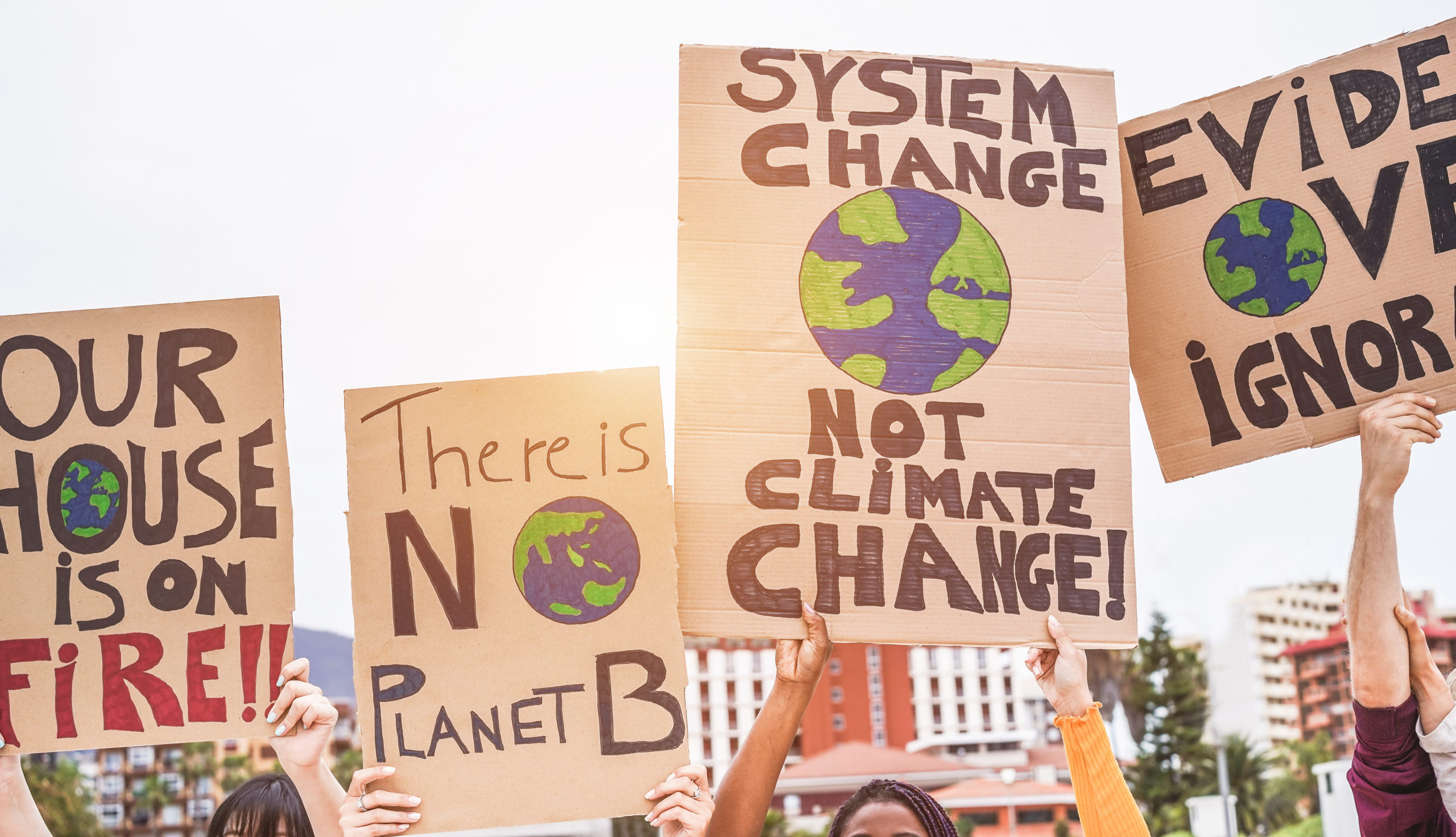Rethinking citizenship for a climate adaptive future
This article was written by a participant of the Global Center on Adaptation’s Young Leaders Program. The program develops young talent to become future leaders in global climate change adaptation efforts by enhancing their knowledge, skills, and ability to thrive in an international environment.
I
first encountered the slogan system change, not climate change on the posters of young Fridays For Future demonstrators. It concisely points to the human-made nature of climate change. But it also got me thinking about our societies’ focus on changing individuals’ morals and behaviors to deal with climate change without taking the system at large into account [1]. In other words, to deal with climate change we not only need to change our individual lifestyles but also ‘escape the ever-running treadmills’ we have institutionalized.
System change of the kind that allows us to lead climate adaptive but also happy and moral lives in 30 or 50 years from now, requires large political, sociological, and cultural changes but also smaller psychological changes to take place today [2, 3]. While not be possible to model the entire complexity of such a system change, it might nevertheless be useful to identify certain changes that make a desired system transformation more likely.
On a psychological level, the transformation toward a climate adaptive (and potentially happy and moral) future may come about by a ‘collective re-thinking’ [2] of citizenship (see this article for an inspiration). Specifically, it entails a change in the attributes that we assign to a typical citizen [4]. If we think about citizens with regard to their political abilities and motivation, we might stereotypically describe them as largely unreasonable and self-interested [5]. Some of these attributes apply if people are put into “us vs them” situations, when their viewpoints are rarely challenged, or when they have to decide only by themselves [6,7].
Ascribing citizens these attributes inevitably limits our perception of the appropriate kinds/levels of citizen involvement in governance. In other words, if the majority of people were unreasonable and self-interested in socio-political situations, then it would make sense to have a few, carefully selected individuals more capable of representing the majority without any involvement of the average citizen.
However, system change of the scale that facilitates a socially acceptable, climate adaptive future might necessitate that the citizen and the socio-political decision that impacts him/her are in active exchange [8]. Especially if we ask every person to change in order to live with a changing climate, we should be mindful of the contradiction in sustaining a ‘glass ceiling’ [2] between the majority of the world population and the decision-making system which enables or delays change [1].
The aim of this article is not to discuss the appropriate kinds of governance but rather to help lift the lid on our perception of citizens’ abilities and motivations. Psychological and political science research as well as practice is enabling a rethinking of citizenship by showing that certain contexts motivate people to be reasonable, benevolent, and cooperative [6,9,10,11].

Vladimir Bojarskich
I. People can be reasonable
People’s reasoning abilities and decision-making can improve when people engage in small group discussions with others who share different viewpoints [6,9]. For example, in a recent study [12], participants who were engaged in discussions of four were more likely to discern the correct response in a complex CO2-trajectories task than participants who only reflected by themselves. When people only reason for themselves or with like-minded people, they tend to support and strengthen views they already had [6]. Yet, when people engage in discussions in viewpoint diverse groups, each and everyone’s views are critically examined [13].
Consider the findings of a large-scale analysis [14] of ca. 160,000 social issue and ca 12,000 political issue Wikipedia articles suggesting that ideologically diverse (vs homogeneous) teams of editors produced higher-quality articles. In situations where people discuss subjects that have one correct answer (as in the CO2-trajectories task) different viewpoints can help find that one answer [15].
When there is no correct answer, as is the case with many social and political issues, different viewpoints and discussions might not be able to discern a correct answer but can help to find an answer that is perceived as more moral and socially acceptable than any one viewpoint could [3,16,17]. Situations that encourage discussions with diverse viewpoints might improve our reasoning abilities and, in the end, may lead to better decisions.

Source: Shutterstock
II. People can be benevolent and cooperative
If you ask people what guiding principles they find important in life, helping others and protecting the environment come out strongest (at least in an analysis of ca 44,000 responses from people representing 22 European countries and Israel [18]). On a similar note, people intend to engage more with environmental protection when they believe that future societies at risk of climate change will be more benevolent [19]. Moreover, small face-to-face group discussions can encourage individuals’ cooperation [20] and benevolent decisions [10].
Existing groups can also be motivated to collaborate if they create overarching goals [21] – which builds a sense of ‘us’ rather than ‘us vs them’. In sum, people want to help and be ‘good’; group settings and overarching goals can, under certain conditions, enable them to work towards this.
Collective rethink
Many activists are already keenly aware of the benefits of citizen involvement [22] and a collective rethinking is happening [23]. For example, the Climate Assembly UK hosts 110 randomly selected citizens over 4 weekends to discuss how the UK should become a net zero carbon emitter by 2050. Their website provides detailed information on how the process is designed and how the citizens were selected.
Similar approaches could be used for climate adaptation. One background paper written for the Global Commission on Adaptation’s flagship report 2019 illustrates how citizen involvement can be crucial for adapting cities and gives examples of how this is already being planned for a number of communities. Another background paper explains how citizen participation can encourage individuals and households to adapt to climate change. And Involve has an extensive knowledge base on the ‘what and how’s of citizen participation.
Not every group discussion with diverse viewpoints will encourage people to be reasonable, benevolent and cooperative. And not every participatory program will yield the anticipated results – but these are currently among the best ‘social tools’ at our disposal. In the end, testing, monitoring, and evaluating will prove vital to understand whether and how citizen involvement can help us cope with a changing climate.
By designing contexts that invite and motivate people from all walks of life to engage in decision-making using reason, good intentions, and a cooperative attitude, we can also rethink citizenship. If we collectively rethink citizenship, we can also imagine more citizen involvement. More citizen involvement may indeed encourage system change, not climate change.
References
[1] Lukacs, M. (2017, July 17). Neoliberalism has conned us into fighting climate change as individuals. The Guardian. Retrieved from https://www.theguardian.com/environment/true-north/2017/jul/17/neoliberalism-has-conned-us-into-fighting-climate-change-as-individuals.
[2] Hammond, M. (2020). Sustainability as a cultural transformation: the role of deliberative democracy. Environmental Politics, 29(1), 173-192.
[3] Bain, P. G., & Bongiorno, R. (2020). It’s not too late to do the right thing: Moral motivations for climate change action. Wiley Interdisciplinary Reviews: Climate Change, 11(1), e615.
[4] Chen, X., Andersen, H., & Barker, P. (1998). Kuhn’s theory of scientific revolutions and cognitive psychology. Philosophical Psychology, 11(1), 5-28.
[5] Carvalho, A. (2010). Media (ted) discourses and climate change: a focus on political subjectivity and (dis) engagement. Wiley Interdisciplinary Reviews: Climate Change, 1(2), 172-179.
[6] Mercier, H., & Landemore, H. (2012). Reasoning is for arguing: Understanding the successes and failures of deliberation. Political Psychology, 33(2), 243-258.
[7] Haidt, J. (2001). The emotional dog and its rational tail: a social intuitionist approach to moral judgment. Psychological Review, 108(4), 814.
[8] Liu, L., Bouman, T., Perlaviciute, G., & Steg, L. (2019). Effects of trust and public participation on acceptability of renewable energy projects in the Netherlands and China. Energy Research & Social Science, 53, 137-144.
[9] Dryzek, J. S., Bächtiger, A., Chambers, S., Cohen, J., Druckman, J. N., Felicetti, A., … & Landemore, H. (2019). The crisis of democracy and the science of deliberation. Science, 363(6432), 1144-1146.
[10] Mendelberg, T. (2002). The deliberative citizen: Theory and evidence. Political Decision Making, Deliberation and Participation, 6(1), 151-193.
[11] Chambers, S. (2018). Human life is group life: deliberative democracy for realists. Critical Review, 30(1-2), 36-48.
[12] Xie, B., Hurlstone, M. J., & Walker, I. (2018). Correct me if I’m wrong: Groups outperform individuals in the climate stabilization task. Frontiers in Psychology, 9, 2274.
[13] Trouche, E., Johansson, P., Hall, L., & Mercier, H. (2016). The selective laziness of reasoning. Cognitive Science, 40(8), 2122-2136.
[14] Shi, F., Teplitskiy, M., Duede, E., & Evans, J. A. (2019). The wisdom of polarized crowds. Nature Human Behaviour, 3(4), 329-336.
[15] Trouche, E., Sander, E., & Mercier, H. (2014). Arguments, more than confidence, explain the good performance of reasoning groups. Journal of Experimental Psychology: General, 143(5), 1958.
[16] Bloom, P. (2010). How do morals change?. Nature, 464(7288), 490.
[17] Perlaviciute, G. (2019). Public participation in decision making on energy projects: when does it lead to better and more acceptable energy projects? In Squintani, L., Darpö, J., Lavrysen, L., & Stoll, P. T. (Eds.). Managing Facts and Feelings in Environmental Governance (pp.10-21). Edward Elgar Publishing.
[18] Bouman, T., & Steg, L. (2019). Motivating Society-wide Pro-environmental Change. One Earth, 1(1), 27-30.
[19] Bain, P. G., Hornsey, M. J., Bongiorno, R., Kashima, Y., & Crimston, D. (2013). Collective futures: How projections about the future of society are related to actions and attitudes supporting social change. Personality and Social Psychology Bulletin, 39(4), 523-539.
[20] von Borgstede, C., Johansson, L.-O., Nilsson, A. (2013). Social dilemmas: motivational, individual, and structural aspects influencing cooperation. In Steg, L. E., Van Den Berg, A. E., & De Groot, J. I. (Eds.). Environmental Psychology: An Introduction (pp. 175-184). BPS Blackwell.
[21] Batalha, L., & Reynolds, K. J. (2012). ASPIRing to mitigate climate change: Superordinate identity in global climate negotiations. Political Psychology, 33(5), 743-760.
[22] Uittenbroek, C. J., Mees, H. L., Hegger, D. L., & Driessen, P. P. (2019). The design of public participation: who participates, when and how? Insights in climate adaptation planning from the Netherlands. Journal of Environmental Planning and Management, 62(14), 2529-2547.
[23] Dryzek, J. S., & Niemeyer, S. (2019). Deliberative democracy and climate governance. Nature Human Behaviour, 3(5), 411-413.
The ideas presented in this article aim to inspire adaptation action – they are the views of the author and do not necessarily reflect those of the Global Center on Adaptation.